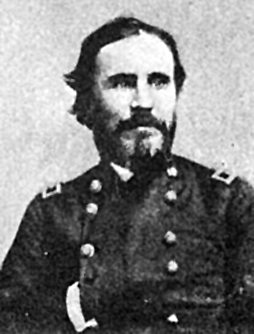|
Kentucky’s Civil War leaders…
An ill temper and distrust of superiors
led to downfall of Union Gen. Harrow
By PHILLIP SEYFRIT
Bugle Staff Writer
(EDITOR’S NOTE: This is the 16th in a series about Kentucky’s officers and battle leaders during the Civil War.)
Union Brig. Gen. William Harrow began the Civil War as a major, but was named a brigadier general in April 1863 after applying directly to President Abraham Lincoln.
However, an ill temper and an inability to work well with superiors led him to resign from the military in April 1865.
The Winchester native, born Nov. 14, 1822, was educated in local schools before his family moved to Lawrenceville, Ill. He later studied law, was admitted to the bar and opened a law practice in Lawrenceville.
During the course of his career, Harrow became a professional associate of Lincoln while traveling with him in the Eighth Judicial District of Illinois. Harrow later moved to Vincennes, Ind., and then to his wife’s hometown of Mt. Vernon, Ind., where he remained until the outbreak of the Civil War.
Harrow’s practice was successful and he became influential in his community. Although mostly ceremonial, he was named captain of the “Knox County Invincibles.”
At the beginning of the Civil War, Harrow was named major in the 14th Indiana under Col. Nathan Kimball. He participated in the battles of Cheat Mountain and Greenbrier River, Va. (now W. Va.), in late 1861 and fought against Stonewall Jackson in the Valley Campaign of early 1862. Promoted to lieutenant colonel and then colonel of the 14th Indiana, his regiment fought at the Sunken Road at the Battle of Antietam where he lost nearly 50 percent of his regiment. As senior colonel, he led a brigade during the Fredericksburg campaign.
After successfully applying to Lincoln for an appointment as brigadier general, he led the 1st Brigade, 2nd Division, of the II Corps under Gen. Winfield Scott Hancock during the Gettysburg campaign. On July 2, 1863, his brigade defended against vicious attacks of Richard Anderson’s Confederates. On July 3, his units helped repel the Pickett-Pettigrew charge and with the wounding of his direct superior, John Gibbon, Harrow took command of the division.
Questions regarding Harrow’s ability to work with his superiors, his military prowess and other personal issues led him to being relieved of command and he was never to serve again in the Army of the Potomac. He was reinstated to field command, however, by his old friend Lincoln.
Transferred to the Western Theater, Harrow commanded the 4th Division of the XV Corps. His men fought well at the Battle of Ezra Church during the Atlanta campaign.
But again, Harrow’s shortcomings led to his division being broken up, leaving him without a command. Perhaps due to his ill temper and past performances, Generals Oliver O. Howard, William T. Sherman and Winfield Scott Hancock refused to accept him and Harrow resigned from the military in 1865.
Harrow returned to Indiana and again occupied himself with his law practice and politics. Originally a radical Republican, he supported Horace Greeley in the presidential election of 1872. While campaigning for Greeley, Harrow was killed in a train derailment in New Albany, Ind., on Sept. 27, 1872. He is buried in Bellefontaine Cemetery in Mt. Vernon, Ind.
Married to Juliette James, Harrow and his wife had one daughter, Ester.
|









